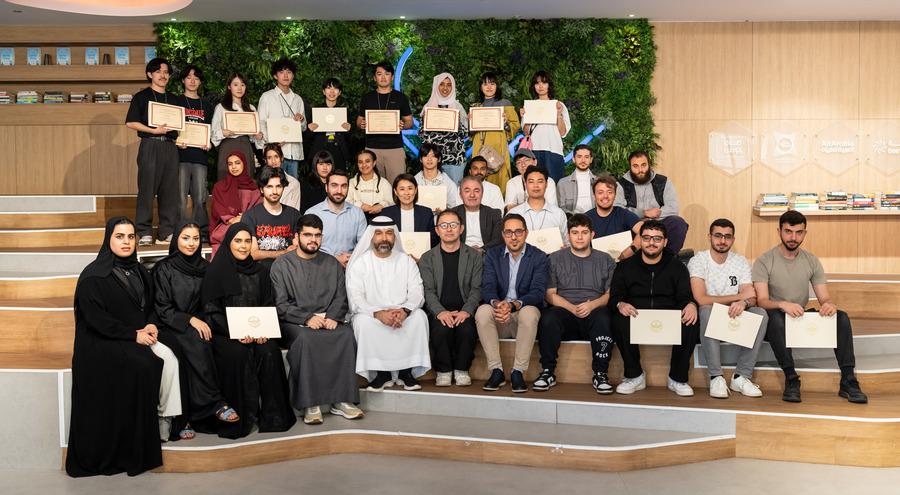- About
- Admissions
- Study at AUS
- Prospective Students
- Bachelor's Degrees
- Master's Degrees
- Doctoral Degrees
- Admission Publications
- International Students
- Contact Admissions
- Grants and Scholarships
- Sponsorship Liaison Services
- Testing Center
- New Undergraduate Student Guide
- New Graduate Student Guide
- File Completion
- New Student Orientation
- Payment Guide
- Executive Education
- Students with Disabilities
- Academics
- Life at AUS
- Research
- Contact Us
- Apply Now
- .

Merging art and engineering: AUS-TMU workshop challenges students to redefine design
Thirty-seven engineering students from American University of Sharjah (AUS) and ten from Tokyo Metropolitan University (TMU), a world-leading university in design thinking and prototyping, expanded their approach to problem-solving by exploring how creativity, emotional expression and functionality intersect in design. Over three days, the Design Thinking Inspired by Art Education: Lighting and Illumination Design workshop, organized by the AUS College of Engineering (CEN) in collaboration with TMU, offered a hands-on experience that blended technical expertise with artistic vision, encouraging students to rethink how design shapes the world around them.
The workshop followed a structured, immersive process, moving students from conceptual thinking to hands-on application. It began with geometric form exploration, where participants examined how circles, triangles and squares serve as fundamental building blocks in design. They then explored the emotional dimension of design, mapping abstract expressions such as warmth, excitement and calmness onto their visual concepts. These ideas were later translated into functional lighting features, where students experimented with brightness, hue and diffusion to create designs that balanced aesthetic appeal with usability.
Dr. Fadi Aloul, Dean of CEN, highlighted the impact of international collaboration in expanding students’ perspectives on design thinking. “Innovation happens when different disciplines and viewpoints come together, and this workshop provided a platform for our students to experience that firsthand. Engaging with international peers allowed them to learn from their peers and see how creativity can drive engineering solutions beyond conventional approaches.”
As the workshop progressed, students moved from conceptualization to prototyping, applying their learning in a hands-on setting. Using Kent paper and lighting components, they built lighting prototypes that reflected both their design aspirations and functional objectives. Through continuous testing, refinement and faculty feedback, they enhanced their models before presenting their final concepts.
Dr. Lutfi Albasha, Professor of Electrical Engineering at AUS and workshop organizer, underscored the importance of integrating design thinking into engineering education.
“Engineering is not just about solving problems—it’s about shaping experiences. This workshop encouraged students to move beyond technical functionality and consider the emotional and aesthetic dimensions of their designs,” he said.
Dr. Keiko Kasamatsu, Professor of Industrial Art at TMU, Designer Takeo Ainoya, Managing Director of serBOTinQ at Tokyo Metropolitan University, Senior Assistant Professor at Tokyo University of Technology and workshop organizer, underscored the importance of the process that connects design education and engineering education.
"In this workshop, we conducted a program that allowed students to experience art thinking, where functions and ideas are conceived through words and images. By engaging in prototyping based on these images, we provided a creative learning experience that emerged from the fusion of design and engineering, as well as cultural exchange. Through this experience, we believe that students not only learned to express their own thoughts and ideas but also recognized the importance of prototyping by sharing a vision as a team," he said.
With a strong focus on experiential learning and global engagement, CEN continues to prepare students for an evolving technological landscape. By fostering cross-disciplinary collaboration and hands-on innovation, AUS ensures that its graduates are critical thinkers, adaptable problem-solvers and future leaders in engineering.
For more information on CEN and its programs, visit www.aus.edu/cen.

